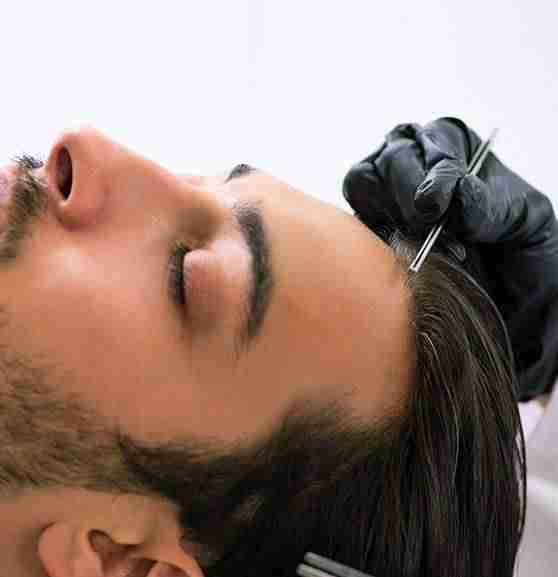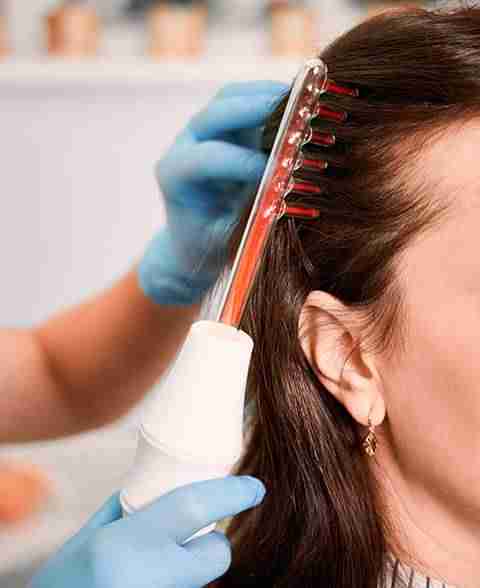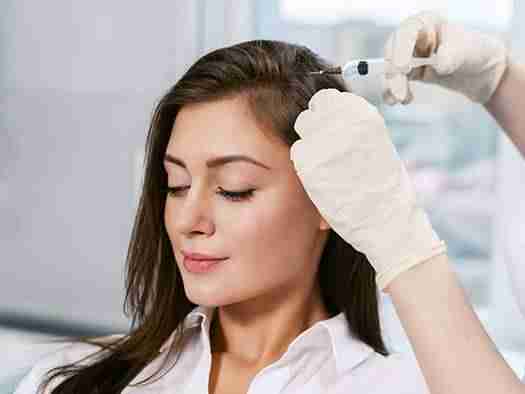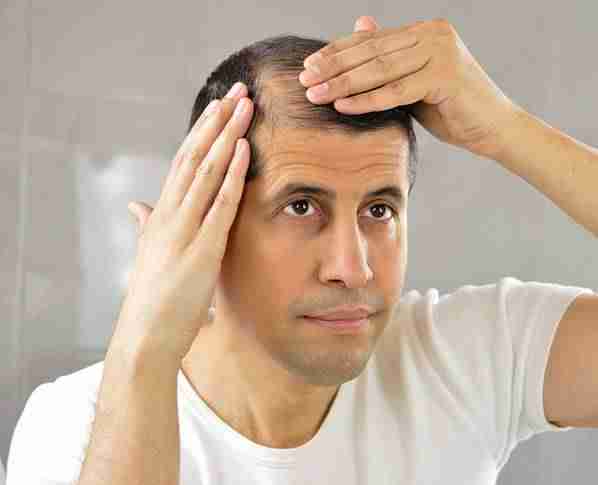
What is Hair Restoration with PRF, PDO Threads and Minoxidil Compound Serum?
Hair Restoration involves Platelet Rich Fibrin (PRF) Injections to the area of hair loss. The injections can be combined with Polydioxanone (PDO) Threads and Minoxidil Alternative Compound Serum to promote the stimulation of hair growth. PRF is a fibrin matrix made up of platelet cytokines that act as an organic and biodegradable scaffold which may release important growth factors and structural proteins that are trapped over time and at high concentrations. PDO Threads are biodegradable polyester dissolvable sutures that help tighten skin and build collagen. Minoxidil is an active metabolite used in the US since receiving FDA clearance in 1988 for Androgenetic Alopecia (AGA).
Call for any question

What are PRF, PDO Threads, and Minoxidil Compound Serum used for?
PRF serves as a resorbable membrane contributing to angiogenesis, which may help promote skin rejuvenation, hair growth, and wound healing. PDO Threads may help stimulate hair growth by stimulating endogenous collagen production, elastin, and hyaluronic acid, as well as activating fibroblasts in both men and women with Androgenetic Alopecia for six or more months. Minoxidil topical therapy is used topically to stimulate hair growth.
Call for any question
Who is an ideal candidate for hair restoration therapy?
Individuals who are in good physical health and do not have any underlying health conditions that could affect healing. Hair Restoration treatment is recommended for individuals experiencing hair loss who still have existing hair follicles.
Call for any question

Who is not recommended for hair restoration therapy?
Individuals with the following should not get the treatment:
-
Acute and chronic infections, skin diseases (i.e., SLE, porphyria, allergies), cancer and/or ongoing chemotherapy, severe metabolic and systemic disorders, abnormal platelet function (blood disorders, i.e., hemodynamic instability, hypofibrinogenaemia, critical thrombocytopenia), chronic liver pathology, anticoagulation therapy, underlying sepsis, systemic use of corticosteroids or within two weeks of the procedure, and pregnant or breastfeeding.
-
Individuals under the age of 18 or those with a known allergy or foreign body sensitivities to synthetic biomaterials should also avoid the treatment.
Call for any question
What are the side effects?
Expected side effects include short-lasting pinkness/redness (flushing), bruising, mild swelling, mild soreness at treatment or injection site, and temporary blood sugar increase. Common side effects to treatment with PDO Threads include discomfort at the injection site, mild swelling, redness, and bruising. You may experience stinging and pulling pain, as well as a scratchy sensation after your procedure, which will begin to subside by week 2 and should disappear by week 5 weeks.
Call for any question

Are there different types of this treatment?
Alternatives include not performing the treatment at all or Platelet Rich Plasma (PRP) injections. There are some basic similarities, and both of these products require blood to be taken from the patient. PRP requires more blood to be taken than PRF and may produce similar risks and benefits. Additional alternative treatments include over-the-counter shampoos or serums, prescription shampoos or serums, or Hair Transplant.
Call for any question

Is there preparation for the treatment?
Individuals should review medical, surgical, medication, and allergy history with a provider prior to treatment. Prepare for your treatment by reading about Hair Restoration, scheduling your treatment 2 weeks before any special events, washing your scalp, and coming to the appointment with clean hair. Read the pre and post treatment instructions to prepare yourself and stop any medications prior to your treatment.
Call for any question

What can I expect during hair restoration therapy?
Your provider will start off with a full evaluation to determine a treatment plan. The treatment involves a simple blood draw into tubes (approx 10 to 20 cc). The tubes are placed in the centrifuge to spin in order to isolate the PRF. Anesthesia is applied depending on the patient's request. The PRF is injected intradermally into the scalp every 2 cm apart with a small needle. For patients opting for PDO Threads in addition to PRF, the PDO Thread embedding therapy involves inserting monofilament smooth PDO Threads into the scalp. Patients are also offered a Minoxidil Compound Serum to be applied every night after showering.
Call for any question
How long does the treatment take?
Depending on the number of areas to be treated as well as the selection of treatment package, the whole process may be as short as 30 to 45 minutes or as long as an hour.
What is the recovery time?
There are very few restrictions with the treatment. Most patients are available to return to their normal activities immediately after treatment.
Will the treatment hurt?
There is minimal pain, but topical anesthetic or nerve blocks are available for your comfort.
Call for any question
How long before results are seen?
Many patients require 3 to 4 treatments to see significant results.
How long do the results last?
Advanced hair loss cannot be treated with these treatments.
Are additional treatments needed?
Maintenance treatments are needed for continued benefits. To maintain the effects, the treatment must be repeated. Over time, the PRF and PDO Threads will gradually break down and be absorbed by your body. As a result, treatments will need to be repeated to maintain the desired effect at least yearly.
Can this treatment be combined with other cosmetic procedures?
Patients often combine Hair Restoration with other cosmetic services that involve PRF or PDO Threads. Talk to your provider about your esthetic goals to set realistic expectations and design a complete treatment plan that may include more than one type of treatment, as well as recommendations on the timing and scheduling of various treatments.
Call for any question
Pre-Treatment Instructions
Post Treatment Instructions
Contact Us
We Look Forward To Meeting You







